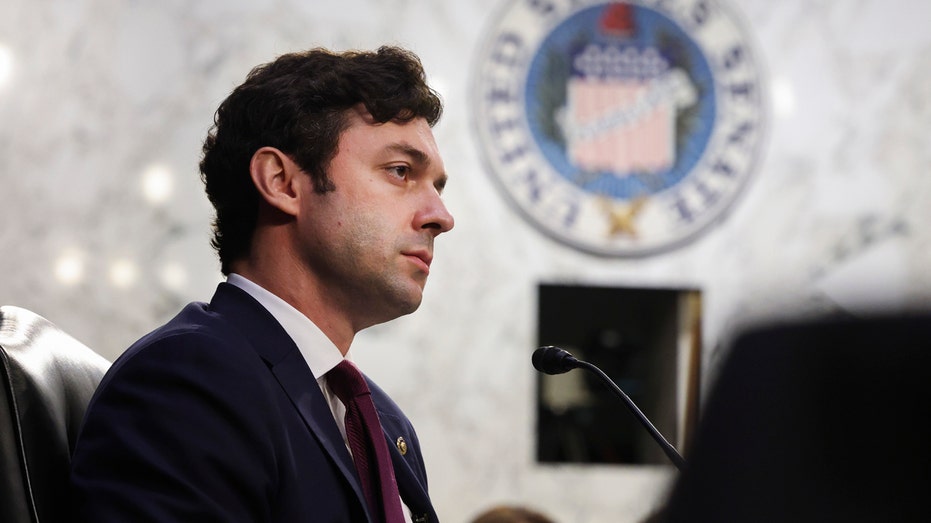Congress renews push to ban stock trades among lawmakers
Banning stock trades among members of Congress has broad bipartisan support
Biden is 'protecting' Pelosi on stock-trading ban: Rep. Stewart
Utah Rep. Chris Stewart weighs in on reports that President Biden's team pulled support of ban on members of Congress stock-trading in SOTU on 'The Evening Edit.'
A handful of Democratic senators are making a renewed push to pass legislation banning members of Congress from trading individual stocks while in elective office.
Sens. Jeff Merkley of Oregon and Jon Ossoff of Georgia are leading a last-ditch effort to pass some type of congressional stock trading ban before the year ends. Lawmakers have introduced several different proposals, but there is no consensus on what the latest measure should look like.
Merkley and Ossoff, along with Sens. Kirsten Gillibrand, D-N.Y., Elizabeth Warren, D-Mass., Gary Peters, D-Mich., Sherrod Brown, D-Ohio, and Mark Kelly, D-Ariz., are participating in a working group to craft consensus legislation, The Hill reported on Thursday.
ELIZABETH WARREN DEMANDS POWELL RELEASE MORE DETAILS ABOUT FED TRADING SCANDAL
The House and Senate are both leaving for a two-week recess that begins on Friday. Merkley has suggested that he wants to use the recess to establish more support in the hopes of getting a bill to the floor and passed before Memorial Day.
Although there is generally a broad consensus among both Democrats and Republicans that there should be some additional limits in place on trading by members of Congress, lawmakers differ fiercely on how to approach the matter.
House Speaker Nancy Pelosi, once a staunch opponent of such restrictions, and House GOP Leader Kevin McCarthy have both indicated they are open to installing some parameters – or outright bans – on lawmakers' ability to trade individual stocks when they are in public office.

Sen. Jon Ossoff (D-GA) questions Treasury Secretary Janet Yellen and Federal Reserve Chairman Jerome Powell during a Senate Banking, Housing and Urban Affairs Committee hearing on the CARES Act, at the Hart Senate Office Building on September 28, 202 (Photo by Kevin Dietsch/Getty Images / Getty Images)
Lawmakers are rushing to reach an agreement before August, when their attention will shift to midterm elections, that will update a 2012 law that currently governs public disclosure and stock trading.
Under the STOCK Act, it's illegal for members of Congress and their families to profit from inside information and it requires lawmakers to report stock trades to Congress within 45 days. In some recent cases, lawmakers have failed to report their trades altogether.
There is also a growing number of Republicans who are lining up against new restrictions on stock trading. Key GOP lawmakers on the Committee on House Administration expressed concern, or opposition, during a three-hour hearing on Thursday centered around banning stock trades.
Rep. Rodney Davis, the committee's ranking Republican, said that certain measures requiring lawmakers to use qualified blind trusts to avoid potential conflicts of interest could be expensive and time-consuming.
"I just don't believe that forcing middle-class members to divest their ownership portion of a family farm or to divest ownership in a business that their spouse may be a part of or their dependent children be a part of," Davis, R-Ill., said. "I just think it's untenable."
Trading restrictions for members of Congress became popular earlier this year after Pelosi's husband, Paul Pelosi, drew scrutiny for his own investments and holdings.

Speaker of the House Nancy Pelosi, D-Calif., meets with reporters to discuss President Joe Biden's domestic agenda including passing a bipartisan infrastructure bill and pushing through a Democrats-only expansion of the social safety net, the at the (AP Photo/J. Scott Applewhite / AP Newsroom)
Although Pelosi does not own any stock herself, her husband holds tens of millions of dollars worth of stocks and options in companies like Apple, Disney, Amazon and Google. Lawmakers' spouses are allowed to trade in companies or industries that their partner may help regulate.
Pelosi is worth an estimated $114 million, according to her 2018 personal financial disclosure, making her the sixth-richest member of the House and the 10th richest member of Congress, according to data tracked by the Center for Responsive Politics.
GET FOX BUSINESS ON THE GO BY CLICKING HERE
The California Democrat initially insisted that members of Congress should be allowed to trade stocks if they choose to do so, telling reporters that lawmakers should be allowed to participate in the "free market economy."
Facing immense pressure from her colleagues, however, Pelosi later did an about-face, suggesting that she would consider proposals banning members of Congress from trading stocks while in elective office.
"I've said to the House Administration Committee, review all the bills that are coming in and see which ones — where the support is in our caucus," Pelosi said in January. "If members want to do that, I'm OK with that."





















